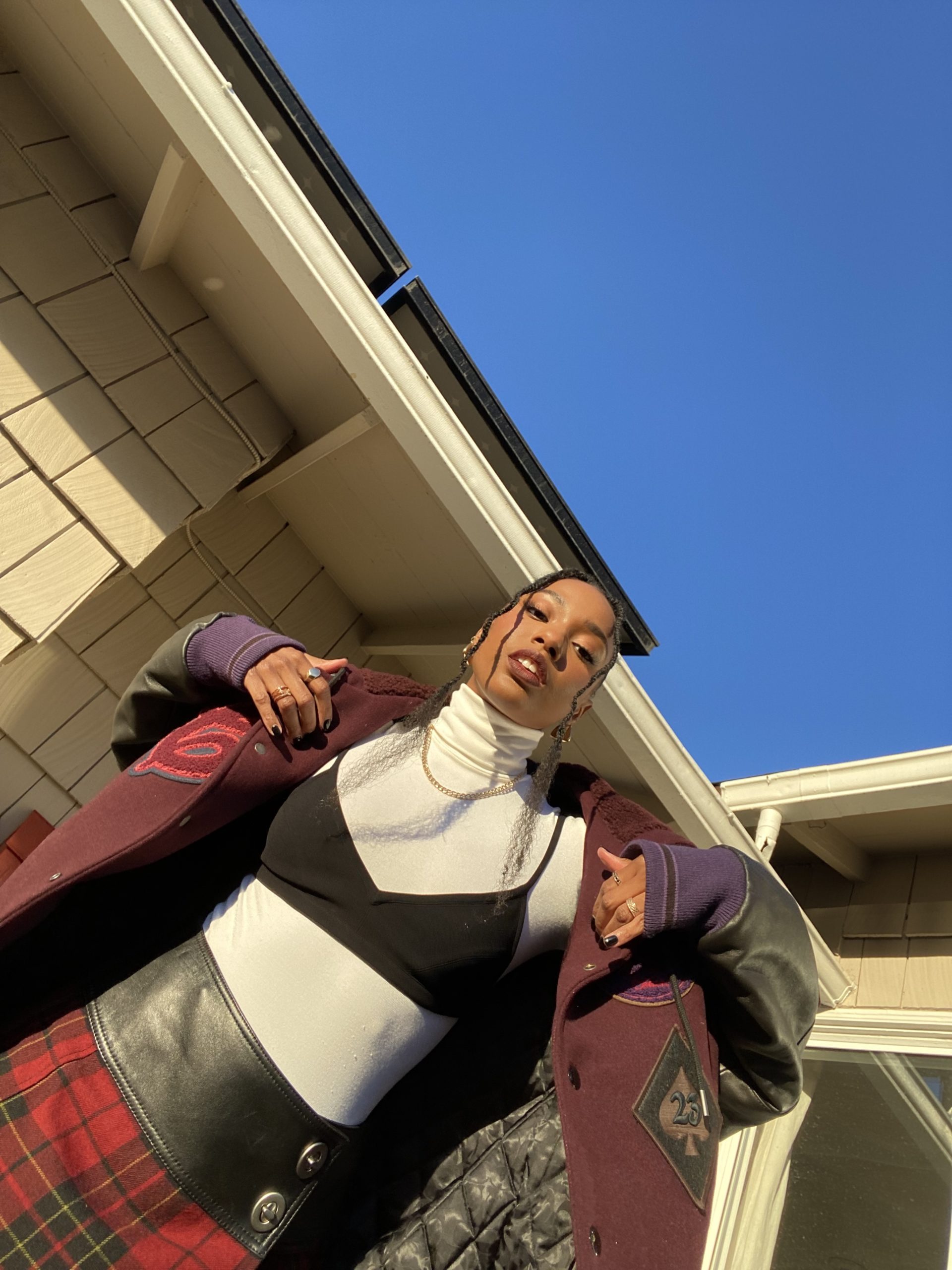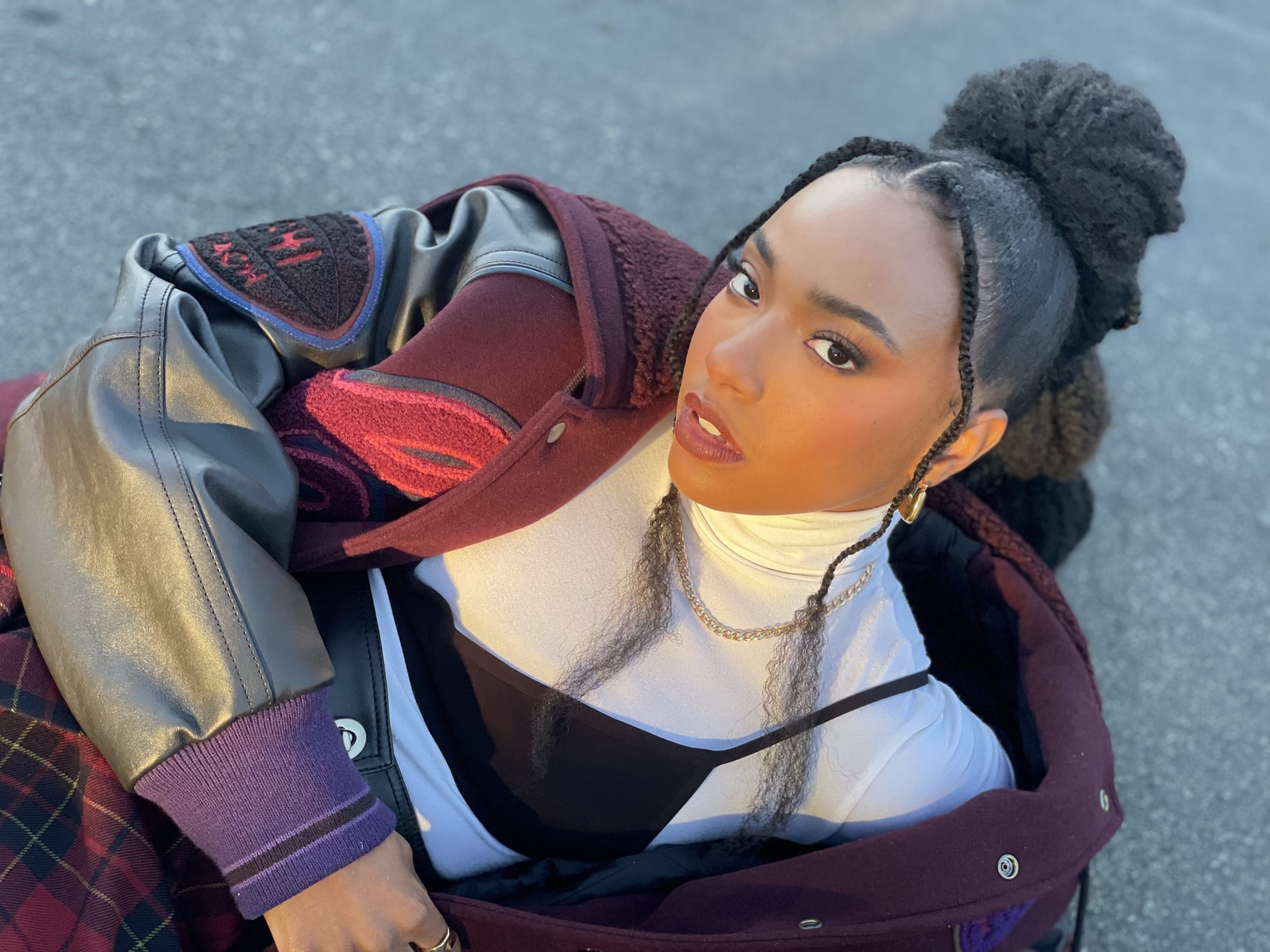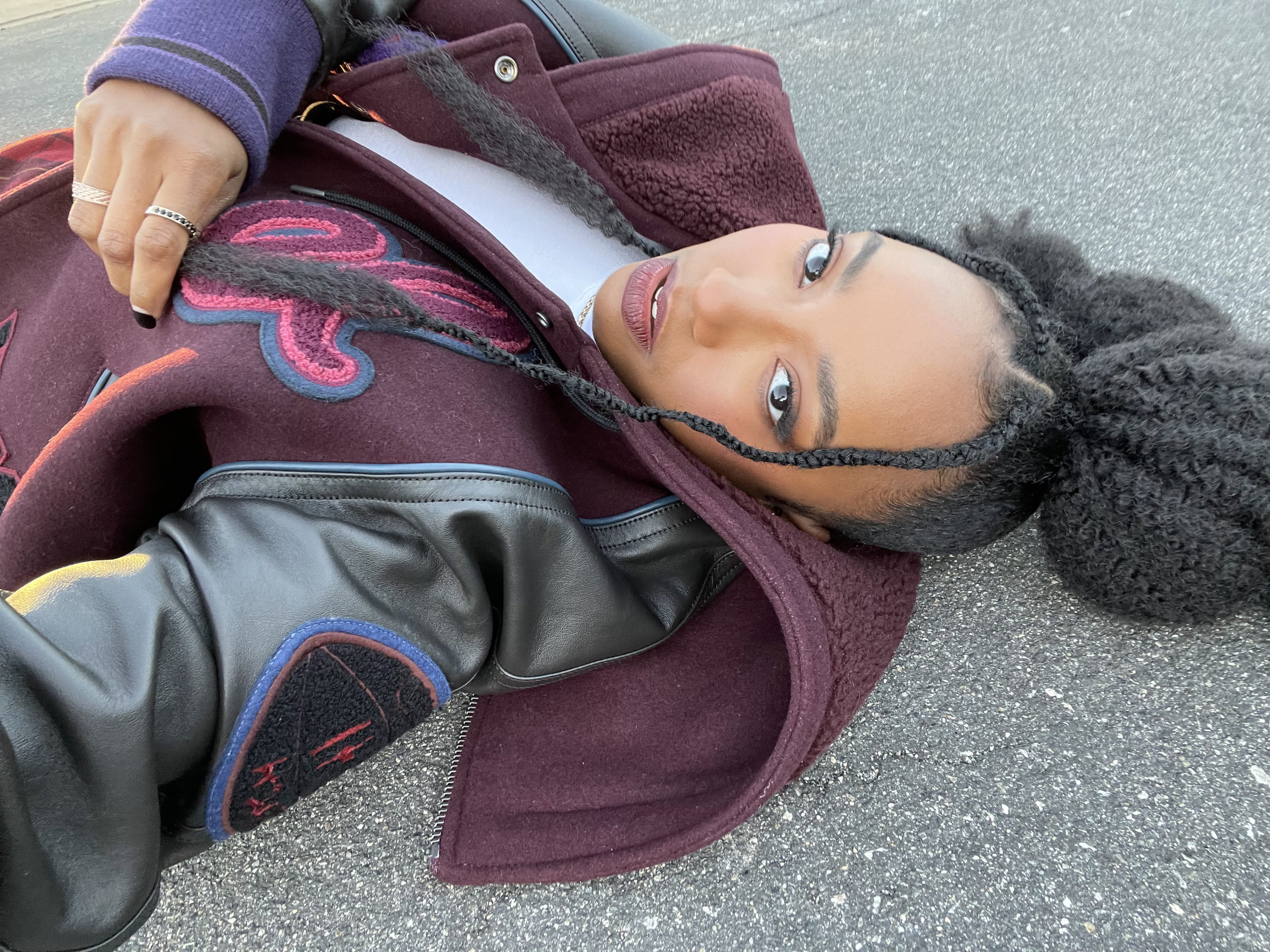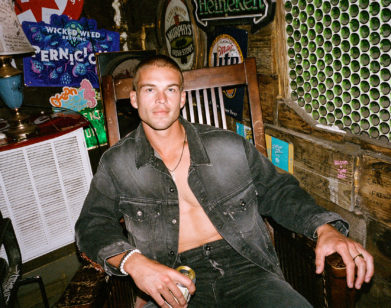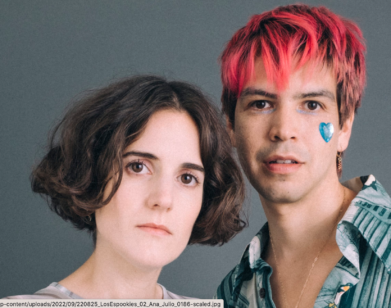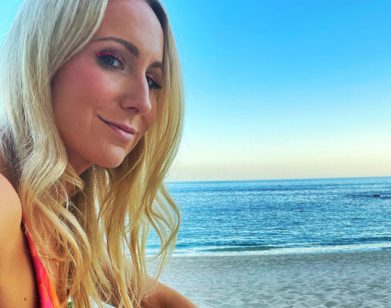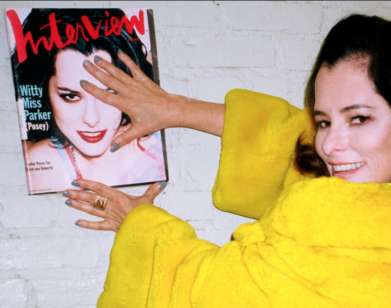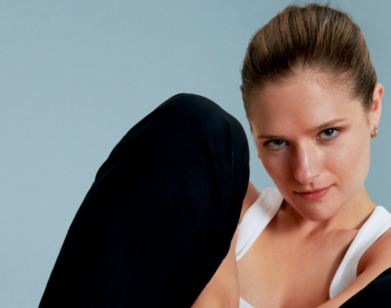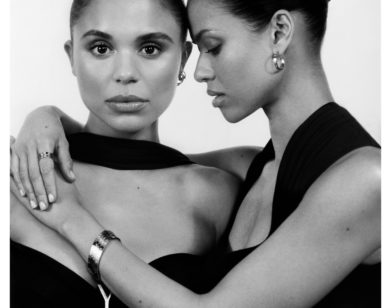LET'S TALK ABOUT SEX
Alyah Chanelle Scott Wants to Be in Control
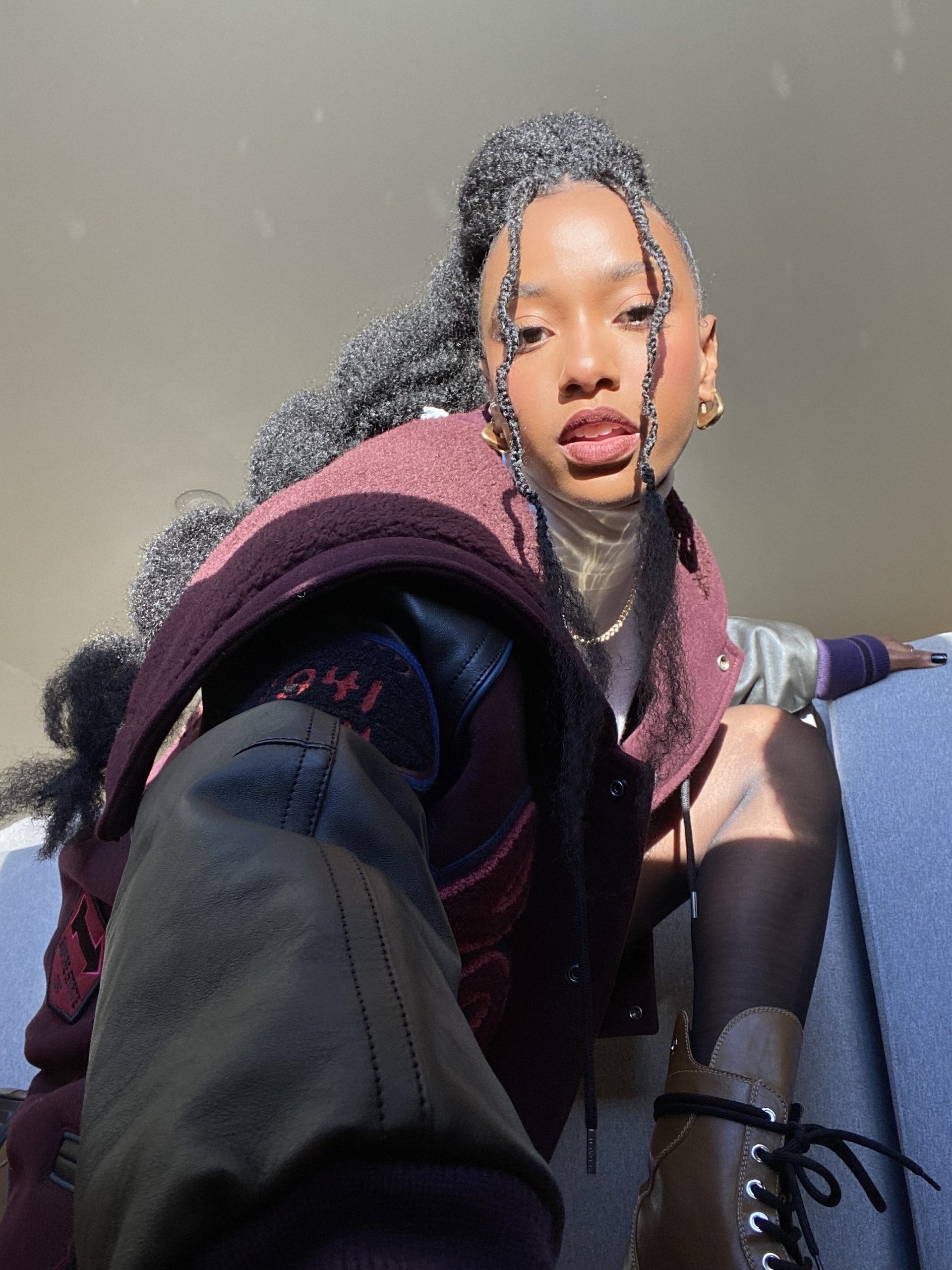
Jacket, Bralette, and Skirt by Coach. Hair: Ameenah Mohammed, make-up: Cherish Brooke Hill, and styling: Amanda Lim.
Class is back in session for the cast of Sex Lives of College Girls, the thirsty and proudly sex-positive Gen Z series from the minds of Mindy Kaling and Justin Noble. The HBO Max show, which premieres its second season today, follows the hijinks of an eclectic group of college girls played by Alyah Chanelle Scott, Reneé Rapp, Amrit Kaur, and Pauline Chalamet, who are forced to become roommates and eventually friends and wing-women. Episode after episode, Sex Lives tackles the intricacies of college life—friendship, family, promiscuity, academics, and the social food chain—with a tone that varies from slapstick to sincere. Scott, who plays Whitney Chase, the audacious daughter of a prominent political figure, had to adjust to the extra attention she garnered after the success of the first season. After cutting her teeth in theatre, the 25-year-old Texas native was thrust into the limelight by her self-assured and hilarious portrayal of a Black college girl just trying to figure her shit out. As her many new fans gear up to binge the highly-anticipated second season of Sex Lives of College Girls this weekend, Scott has her eyes set on a return to the stage—or producing and directing something of her own. As she tells Dylan Mulvaney, her long-time friend, TikTok star, and former cast member in The Book of Mormon, the rest is still unwritten.—ERNESTO MACIAS
———
ALYAH CHANELLE SCOTT: Hello? Can you hear me, Dyl?
MULVANEY: Do you need me to go on video?
SCOTT: Can you? So that I can see your pretty face?
MULVANEY: Yes.
SCOTT: To be clear, she did send me a picture of herself about a minute ago and said “I’m horrible,” and then I sent a selfie and said, “I’m also horrible.”
MULVANEY: I’m wearing my tie-dye cat t-shirt.
SCOTT: As you should. It’s early over there.
MULVANEY: I had a sip of coffee for you.
SCOTT: Wow, thank you so much.
MULVANEY: That’s big. So you’re leaving New York?
SCOTT: Yes, I’m coming back home, back to L.A. Kind of sad about it, to be honest. New York was good this time around, honestly. I saw a lot of friends, felt in control of myself, and was empowered in a way that I don’t [feel] in L.A. You get caught up in your routine, and in New York, there’s more spontaneity and fun.
MULVANEY: Were you there for work, or did you get to play?
SCOTT: We did a little bit of both, as we do.
MULVANEY: Do you see a New York move in your future?
SCOTT: This is the question of the day, of the trip, really. I don’t know. Secretly, I do. We saw Wicked last night. I forced everyone to go see Wicked because that’s the thing I do when I’m here. Reneé [Rapp] had never seen it before so I was like, “You know what would be really good in this crazy 12-hour press day? Let’s go see Wicked.” There was a group of eight, and two of my high school friends. It was just a fun group of people.
MULVANEY: Was it magical?
SCOTT: I feel it’s one of the only shows that hold up, at least in my book. I tend to go back and watch things again.
MULVANEY: I’ve seen it 10 times. Now the question is: what is your Broadway dream role at the moment?
SCOTT: I’d like to say it hasn’t been written yet. That would be cute, to do something original. But I also just love The Light in the Piazza. I would love to do that show. What is your Broadway dream role?
MULVANEY: Well, probably Glinda in Wicked…
SCOTT: I was watching it and I was going to text you, “You could easily do this.” We haven’t done theater since we were on tour. Are you in your new home?
MULVANEY: It’s my second night at the new house.
SCOTT: I’m so excited.
MULVANEY: I’m a little closer to you, and I will have you over ASAP. Now, we met doing Book of Mormon.
SCOTT: Yes. What a time, what a place, what an era. We were two different people back then.
MULVANEY: The year was 2019. I don’t think we knew how good we had it.
SCOTT: Oh, is that your take on that? You don’t think we knew how good we had it? I’ve never heard that.
MULVANEY: Now that my life has become so much more complicated than it was.
SCOTT: Yes. It was simple.
MULVANEY: It was simple, and it did feel like the fifth year of college. We were very young.
SCOTT: There was no real responsibility besides getting on stage every night. You just had to be at the theater by 7:00 p.m. It was fun in that way. I also feel like, tell me if I’m wrong, I could not do that again. That definitely could only exist at that time, and I don’t think I have any desire to live that version of my life again. I don’t even know how to describe this.
MULVANEY: It served for a reason and a season.
SCOTT: Standing on that stage and saying those words as the people we were back then, seeing those audiences. I remember being in Gainesville, Florida and looking out into a sea of, honestly, gray hair, white skin, old white people. I was like, “I don’t know if this is a place that gets the story I’m trying to tell. I think they’re getting a different version of the show, and I have no control over that.” I think I did it for nine months, over 200 shows. Just staying on the stage and feeling like my voice was gone.
MULVANEY: Creatively getting plucked into a show that had been running for years, especially one that was on tour, not even in New York. I feel like that is one of the least creatively independent things you can do. We are there to basically do what was done before us.
SCOTT: Yeah.
MULVANEY: I do remember sitting in the wings, nearly every single night, and I would get there early just so I could watch your song. I also remember during that time, how impressed I was by your drive. One of the most driven people I’ve ever met, even being so young. I also got to see your silly side. I feel like I brought that out.
SCOTT: You did.
MULVANEY: What would you tell that previous version of Alyah right now?
SCOTT: Oh, that’s such an interesting question. I don’t know if I would say anything, to be honest. I think that was a time I needed to have. I needed to feel those feelings and every ounce of the disappointment that came with that job. I think it only taught me how I wanted to show up in other spaces. As a Black actor, as someone who wants to have a voice and make a difference, I think I needed to be in it. I think I always tell myself, it will end at some point. Just hold on. It ended much sooner than we thought it was going to end because of COVID.
MULVANEY: Very accidentally.
SCOTT: When you were on tour, were you ready for it to end, or were you happy with where you were? It was also a very different time for you in terms of gender and your journey.
MULVANEY: It’s funny because in some ways, I look back on that version of myself and I feel guilty that I still hadn’t come out as my true self. Then I take a moment to forgive myself and say, “enjoy this time that felt very uncomplicated.” As much as I am so much closer to being 100 percent authentic now as a trans woman, I also think there is something that has gotten really complicated about being that.
SCOTT: Life was much simpler.
MULVANEY: I’m happier now in a lot of ways, but at the same time, as we’re growing older, there’s all these new responsibilities and all these new hoops to jump through that I didn’t even know were there before. I think both of us have a place back on stage at some point, in some way.
SCOTT: Yeah.
MULVANEY: I hope I get to do it again with you because that would be kind of full-circle magical.
SCOTT: That’d be so fun.
MULVANEY: Then we both ended up in L.A. after the show and the pandemic.
SCOTT: The last city we played in was L.A., I remember we were supposed to be there for six weeks and we were only there for three. It was March 12th, 2020. I remember we went on a Hollywood tour on one of those—
MULVANEY: Celebrity homes tour.
SCOTT: Yes. We were like, “this is such a fun city. Imagine if we lived here. Imagine if we worked here, what a dream that would be.” We had no plan for how to make that happen. We just wanted it, I think.
MULVANEY: I think we were supposed to end there because I fell in love with the city. I’m from San Diego, but it still felt far away. Now we’re both here. You really went off to the races by booking Sex Lives of College Girls so early on.
SCOTT: Right.
MULVANEY: I remember that process for you, it was like a master class for me. Coming from the theater world, I had never seen someone go through screening tests and all of those hoops that you had to jump through. What would you say was your overall takeaway going from theater to TV?
SCOTT: I think my perception when I was in the theater was that in TV, they’ve got it figured out. They have all of the money, they have all the resources, they have all of the answers, and the theater’s just a very limited version of that. To a degree, that was true. I think I have a little bit more agency as an actor on TV now. At the same time, there are still things that I see that I’m like “Oh, maybe these weren’t things about TV or theater, but things about Alyah that I need to internalize and address and come to terms that this may just be the world.” Maybe I have a higher purpose than being an actor. Maybe the disappointment that I find in these spaces isn’t inherently about the spaces, but more so about the world. I think the transition was simple in terms of what the job required as an actor, but emotionally, there was so much of a learning curve with the TV thing—how does one navigate the space? It was just a whole different level of being a human that I don’t know if I was fully ready for, or ever will be fully ready for. We talk about this all the time, I’m a very private person. I commend you for always being so courageous and brave and willing to be so open and vulnerable about your life online. That’s something that I feel people ask of you once you reach a certain point. I just resist that so much.
MULVANEY: Hey, coming from the other side of it, I say keep resisting until you can’t. What is your view of social media?
SCOTT: I love it for the things I love it for. I really do enjoy learning things online. I’m a grandma. I’m not trying to go out. I’m not really about that life. I just really use social media to see my friends and to learn things about the world. I’m not really into the social game of influencing and all of that stuff. For me, it doesn’t feel authentic. It feels like something that would stress me out more than it would bring me joy. I know that you’re having this moment where you’re questioning, you can’t really go back, now that you’ve opened that door and you’ve allowed so many people to see you, which is beautiful, and for so long was bringing you so much joy and filling you up. Talk to me about where you’re at on that journey, and how you’re feeling about that.
MULVANEY: I think once you get so vulnerable, it’s nearly impossible to go backward.
SCOTT: Yeah.
MULVANEY: People will keep taking as much as they can get. I’ve given a lot and people have taken a lot. I very much did not want to be an influencer so much as I needed an outlet creatively, because theater wasn’t around anymore.
SCOTT: By the way, I fully encouraged you to do that.
MULVANEY: You were the one. Oh my gosh. Alyah Scott is the person that told me to download TikTok. I assumed that it was kid’s stuff. I guess I owe it all to you, babe.
SCOTT: You owe it all to yourself. Your personality falls in line with that.
MULVANEY: And with how your career trajectory worked very quickly with Sex Lives coming into your life, I was trying to find ways that felt authentic and felt like me, since neither of us came from families that had influence here. Luckily, social media has now created all those opportunities that I always wanted, but still, I have to feed the beast. I have to find the courage to say, “Not today.” You do a lot of pottery and poetry, is that something that you like to keep private, or is that something you eventually would want to share publicly?
SCOTT: Every one of my friends in my life for the last month has asked me that question. To be honest, I don’t know if the answer is out of fear or out of just wanting to keep it. I’m in a period of deep change. Everything in my life is shifting. My desires are shifting. I’m interested in exploring new things. I want to learn about writing and producing. Since Sex Lives started, I don’t know if I’ve ever allowed myself to exist online the way I did before. Do I want to share things with these people I don’t know or the people that I know and love? I can just call Dylan and say, “Hi, I’m doing this.”
MULVANEY: I always assumed that would be how my life worked too, somebody would approach me as knowing me as a character. People truly believe that they’re best friends with me.
SCOTT: I think that scares me. That’s maybe why I hesitate to do that because I don’t want people to feel like they have access to me. There’s something beautiful about people relating to you and feeling so passionate about seeing you, and feeling they are your best friend. That can only be seen as a positive thing. That’s not a bad thing.
MULVANEY: Well, I think actors are told to not be too opinionated or too out there, so as to not turn anyone off. Now, I think a lot of us are stepping into this power of “Oh my gosh, there’s so much more here than just playing a character, or I like myself,” even when I’m not working.
SCOTT: Yes.
MULVANEY: How has season two of Sex Lives differed from season one? Not for your character, but for you personally, mentally, and spiritually?
SCOTT: I think season one was a lot of unlearning. Honestly, there’s a lot of rhetoric about how to be a good actor, how to be someone people want to work with, how to be likable, and how to work in these spaces and get hired again. So during Sex Lives, season one, I kind of wanted to tell myself, “Hey, it’s okay to have opinions about things. If you feel strongly about something, speak your mind.” It was so much harder than I thought it was going to be because the stakes were so much higher. It felt like at any moment, some daddy from HBO Max was going to be like, “You’re fired.” We would constantly joke about the fact that we were so scared of losing our jobs. You hear so many horror stories. I dealt with a lot of imposter syndrome. For season two, I definitely felt more comfortable just sharing my thoughts, existing in this space, and feeling like an equal contributor.
MULVANEY: You are supposed to be. Even you being in the space has helped so many of your friends, including me, really understand what the space is. I think friendship is such a key element to being successful in this business, which does not mean networking. It means having the real ones that will tell you how this all works.
SCOTT: It’s such a mystified world out there in terms of the industry. It feels like one of those things that you can’t ever learn. They can’t teach you in school how to show up and be your authentic self in those spaces. That’s not something that people teach you. It’s just stuff you hear from your friends. I feel like our schooling now is through each other and watching each other fail and learn.
MULVANEY: Agreed. I remember there was a point during the beginning of Sex Lives, where you got bad at texting for a while there. I never judged you hard for it because I knew that it was a lot. Now, a year later, all of these crazy things started happening to me, and I’ve become—
SCOTT: A bad texter.
MULVANEY: The worst texter in the world. We’re passing the baton back and forth. It feels good because I think we’ve really had to lean on each other in multiple ways throughout these past few years.
SCOTT: How do you think 2019 Alyah and 2019 Dylan would feel about what we’re doing now and where we’re now? I’d like to think that they’d be really proud and kind of shocked.
MULVANEY: I think that they would be fangirling. I would like to think that those two kids were obsessed with the Sex Lives of College Girls and probably would watch some trans girl named Dylan’s TikToks after the show. We need to go back to Sedona.
SCOTT: It’s time. It’s time to get our energy healed. I’m feeling that.
MULVANEY: Well, you talked about how your goals have been shifting a lot lately, and whether that’s directing, producing. What do you think is the long-term goal?
SCOTT: That’s a great question. I’m not sure if I have the answer. I think I need to try the hats on to know. The long-term goal was always acting, and that proved to not be the case, entirely. I have really strong opinions. I’ve always been this way. I think I have a very strong artistic voice that I’m just trying to tap into in some way because I don’t know if I would be happy if I didn’t let myself try to at least be creative and have creative control. I would love to be doing things that bring me joy, whatever that looks like. I could literally be, I don’t know, directing community theater. I’d probably be happy. I don’t want to say what it looks like exactly, but just something that I feel in control of the narrative, and that brings me joy. What do you think your long-term goal is?
MULVANEY: I’m writing a book. What I’ve found so difficult about writing the book has been that I have to keep up with these other 29 jobs that I’ve taken on. Writing a book is a full-time job. It becomes a question of, “Am I going to write a chapter right now, or am I going to make a TikTok video?” That’s a hard habit to break, especially when this feels so instantaneous and it feels like there’s an addiction to it.
SCOTT: It’s gratifying.
MULVANEY: I don’t believe that we should be perceived by millions of people on such a vulnerable level every single day. I’m having to come to terms with the fact that this is not how humans were supposed to communicate. In some of my videos, I get like 50,000 comments. The fact that 50,000 people can tell me something is wild.
SCOTT: Yeah.
MULVANEY: I don’t know if that’s why we we’re put here, but I can’t wait to use these next few years to find that balance between being myself and getting to be another character. I think taking a little break from me and jumping into something scripted would be really good for my soul right now.
SCOTT: You wanted to do that for a minute.
MULVANEY: It will come. I think specifically these past few weeks have been very political, and that has added another layer of haters finding me and people kind of flooding their opinions onto me. I don’t want to say there’s an expiration date on being perceived this way, but I think there’s a time and a place for being this vulnerable. I’ll take this minute-by-minute, and hopefully I’ll get to a place where I can have you over for a dinner party with our kids, and get to share what’s going on, and that you don’t have to find out via TikTok. Do you find yourself working better on your own, or do you crave that collaboration?
SCOTT: That’s such a good question. It depends on what space. I think I’ve only collaborated creatively as an actor. I don’t think I’ve ever tried any other type of collaboration. I’m a little bit nervous about sharing my writing with people. You know this.
MULVANEY: Send it to me. Send it to me. Send it to me.
SCOTT: I do feel like maybe that’s out of fear, and I need to just get over the hump and do it. I feel everything. I don’t know. Right now, I’m happy alone. Feeling good about that.

